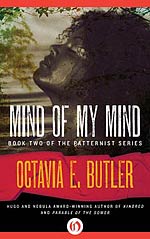
![]() thrak
thrak
9/24/2014
![]()
"I recall warning you about underestimating young women."
'Mind Of My Mind' tells how the psychics Doro has been breeding for centuries in 'Wild Seed' finally come together in one great psychic Pattern. It was written second in the sequence. While less intense than 'Wild Seed', it's still a compelling tale, and brings Doro and Emma's story arcs to a satisfying conclusion. The protagonist, Mary, is a young woman bred by Doro in an experiment to create more stable psychics who are able to stand being around each other, unlike the frequently psychotic and dangerous individuals they usually turn out to be. The experiment turns out more successful than he could have hoped, with Mary establishing the Pattern, a psychic net that eventually pulls all of Doro's people together. However, soon this mean that her power challenges Doro's own, and he challenges her in a final confrontation.
Doro gets his karmic comeuppance, and it's wonderfully appropriate. He lives to see the society he built mature into something powerful that will inherit the earth, just as he realises that he himself can have no part in this. Ultimately he remains just as lonely and outcast as ever. Emma decides to die Doro she can't go on without him.
Mary is a compelling protagonist. An African American young woman who was a tearaway as a youth, she outgrows Doro's shadow and realises that she can do things differently, building a society in which the psychics look out for each other and educate their children, with anyone unwilling to change from being too violent or destructive cast out. Like Anyanwu before her, she is able to go some way towards healing these marginalised people. Ultimately she is able to defeat Doro by drawing on the strength of her fellow Patternists, which they are willing to let her do because they realise she will be a better leader than Doro.
Butler is on fine form exploring racial tension. When Doro sets Mary up with Karl, a white man he wants her to breed with, after seeing his large house and servants, she asks him:
"'How do you feel about black people?'
"He looked at me, one eyebrow raised. 'You've seen my cook.'
"'Right. So how do you feel about black people?'"
I really like that Mary calls him out on his crap. Jan, one of the first psychics that Mary draws to her once she gains her powers, is overtly racists at the start. Just because the characters share special powers does not mean that the old social divisions immediately evaporate. However in order to be part of the Pattern, Jan has to learn to accept people as they are. This is treated as part of the healing process, along with alcoholism and prostitution. Doro's people have been marginalised and outcast because of their powers; now that they are coming together as a society their vices, prejudices and bad behaviour need to be weeded out.
Also, you can see early signs of the Patternist treatment of people without psychic powers, or 'mutes', as they call them. Karl has a non-psychic girlfriend that he programmes not to get jealous or angry. The disparity in power between those with psychic powers and those without leads again to this dehumanisation, even as they decry Doro for treating them like animals. While the brave new world may be better for the Patternists, things are not going to be so good for the mutes. And the system of the Pattern, with one single Patternmaster holding all the power, is still based around a hierarchy with a massive power imbalance. As seen in 'Patternmaster', this can lead to problems.
http://goldenapplesofthewest.blogspot.co.uk/2014/09/octavia-e-butler-patternist-series-1976.html